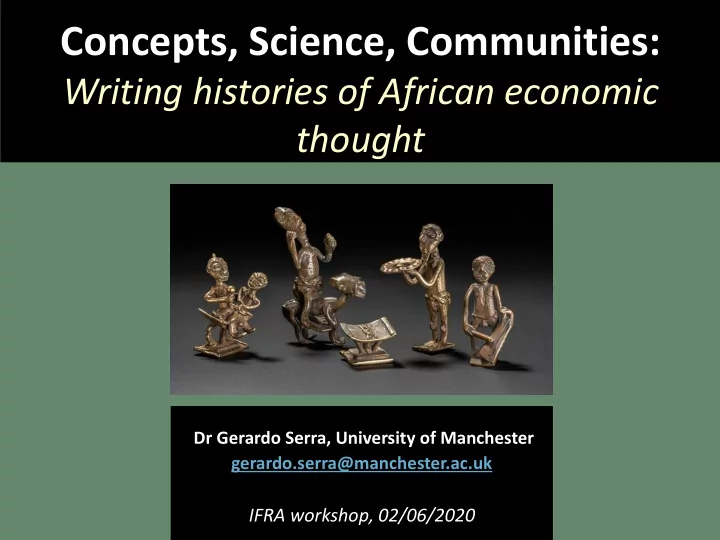

Concepts, Science, Communities: Writing histories of African economic thought Dr Gerardo Serra, University of Manchester gerardo.serra@manchester.ac.uk IFRA workshop, 02/06/2020
Outline • Histories of economic thought • Writing histories of African economic thought: 3 paths • Conclusions
Histories of economic thought • Political economy, economics and their history • ‘Rational reconstruction’ vs. ‘historical reconstruction’ • What is the history of economic thought for? J. Schumpeter (1883-1950)
HI HIST STORIES ORIES OF OF AFRICA AFRICAN N EC ECONOMIC ONOMIC THOUG TH OUGHT HT: : Th Three ee pos ossible sible pat aths hs
I. Concepts
What is conceptual history? • Not all history of ideas is ‘conceptual history’ • Beyond ‘intellectual elites’ • Same form, different meanings R. Koselleck (1923-2006) • Concepts construct the horizon within which historical actors make sense of the world and operate in it
Where do we look for concepts? Gold weight, Funtunfunefu- Denkyemfunefu
‘Wealth’ in Asante history • Sika • Golden Stool (sika dwa kofi) and Golden elephant tail (sika mena) • Degrees of complementarity • 19 th century: collapse of the intellectual order
Poverty in words and proverbs • Umphawi (Chewa) lack of kin and friends • ‘The poor man has no friend’ ( Twi proverb) • ‘ The common people make their soup without meat, and the destitute make it without salt’ ( Hausa proverb) • ‘When are you are a poor man, you stay at home and do not mix with public affairs’ ( Twi proverb) • ‘The person who has been poor since long ago speaks thus: What did the Muganda leave me with?’ (Lusoga proverb) • ‘I grew up dancing: says the one dressed in an old barkcloth ’ (Luganda proverb)
Poverty in Uganda: a longue durée view • 14 languages, 2 main linguistic groups (Great Lakes Bantu - with focus on North Nyanza), Eastern Nilotic) • Typicality • ‘Roots’ semantic spheres
EASTERN NILOTIC language group ROOT LANGUAGE WORD MEANING acanaanu poverty trouble, affliction, Ngakarimojong ngican suffering akicanut poverty to annoy, to disturb, to -can- Turkana akican trouble akulyako abject poverty poverty due to lack of Ngakarimojong akulyakanut cattle -kuly- Turkana ekulikit destitute R. Stephens, ‘ “Wealth”, “Poverty” and the Question of Conceptual History in Oral Contexts: Uganda from c. 1000 CE’
NORTH NYANZA language group ROOT LANGUAGE WORD MEANING Lugwere obutáki poverty obutáki misery, degradation deficiency in conducts, manners, money, etiquette physical, social and spiritual -ták- Lusoga butaki ineptitude obúnakú destitution, misery, suffering Lusoga olúnakú day nakù poor, distressed -naku- Luganda òlùnakù day R. Stephens, ‘ “Wealth”, “Poverty” and the Question of Conceptual History in Oral Contexts: Uganda from c. 1000 CE’
Neo-colonialism ‘The greatest danger facing Africa is neo-colonialism and its major instrument, balkanisation’ AFRICA MUST UNITE (1963) ‘The essence of neo -colonialism is that the State which is subject to it is, in theory, independent {…} In reality its economic system, and thus its political policy is directed from outside’ NEO-COLONIALISM (1965)
Neo-colonialism Jean Paul Sartre
The National Archives (London), DO/35/9424
Public Records Archives and Administration Department (Accra), RG17/1/366
Summary • Koselleck and beyond • It can facilitate historical reconstructions in the longue duree • It can result in a very selective understanding of ‘context’ surrounding the concept chosen • It invites the incorporation of a wide range of sources • Draws on interdisciplinary skills that are consolidated in African studies (ethnography, linguistics, archaeology)
II. Science
Africa and Western science: from ‘anthropology’ to ‘economics’ E.B. Worthington (1938) Science in Africa Reprinted in H. Tilley, Africa as a Living Laboratory: Empire, Development and the Problem of Scientific Knowledge, 1870-1950
From the desk to the field: anthropology as science and administration The National Archives (London), CO 96/688/11 (1929, Anthropological Research)
Colonial anthropology as anti-colonial discourse ‘To {…} all the dispossessed youth of Africa: for perpetuation of communion with ancestral spirits through the fight for African freedom, and in the firm faith that the dead, the living and the unborn will unite to rebuild the destroyed shrines ’ 1938
Theory and observation Polly Hill Phyllis Deane Wolfgang Stolper LLK/7/8, King’s College, Cambridge • From ‘ Af African ican eco conomic nomic thought’ to ‘ ec economics onomics in Africa’ • Na Nati tional onal income come ac accoun counts ts
Theory and observation • ‘Global division of labour’? grand-narratives and theorising vs. empirical observation Pius Okigbo 1924-2000 • From national income accounts to ‘ Okparanomics ’
Scientific communities: Ibadan vs. Zaria • Federal finance vs. Marxian political economy • Communities: 1) Bibliometrics 2) Prosopography 3) Social network analysis 4) Witness seminar
Summary • History of science : from ‘great discoveries’ and diffusionism to emphasis on practice and communities • Re-think colonial encounter and its aftermath • Epistemologies and disciplinary identities • Theory and observation • Sociology of a profession and the politics of expertise • From biography to bibliometrics and prosopography
III. Communities: from ‘economics’ to ‘ oeconomia ’
Development as state-building ‘The picture depicts life in Africa in the 1960s. [ … ]. It portrays the uncanny ability of the African to derive joy from traditional cultural activities, and to master the techniques directly needed in the solution of the development problems of Africa. It reveals the secret of effective African nationhood, namely a sense of oneness between the rural and the city African, between the educated and the uneducated, and between the rich and the poor’ . David M. Rubenstein Rare Books & Manuscript Library (Duke University). Gerald Meier papers, box S1.
Pan-Africanism as economic thought • The African system as ‘socialistic and cooperative’, ‘widest concentration of land and well- being’ but advocacy of British Edward Blyden (1832-1912 ) colonialism ( Blyden, 1908, African Life and Customs ) • Winfried Tete-Ansah, 1930, Africa Works
Pan-Africanism in 1960s Ghana CONCEPT – SCIENCE – COMMUNITY
CON ONCL CLUSIONS USIONS
Conclusions • ‘Development’ and beyond • Methodological pluralism and publication opportunities • Decolonising knowledge • Towards ‘ Afrotopia ’
Thank you for your attention. gerardo.serra@manchester.ac.uk
Recommend
More recommend